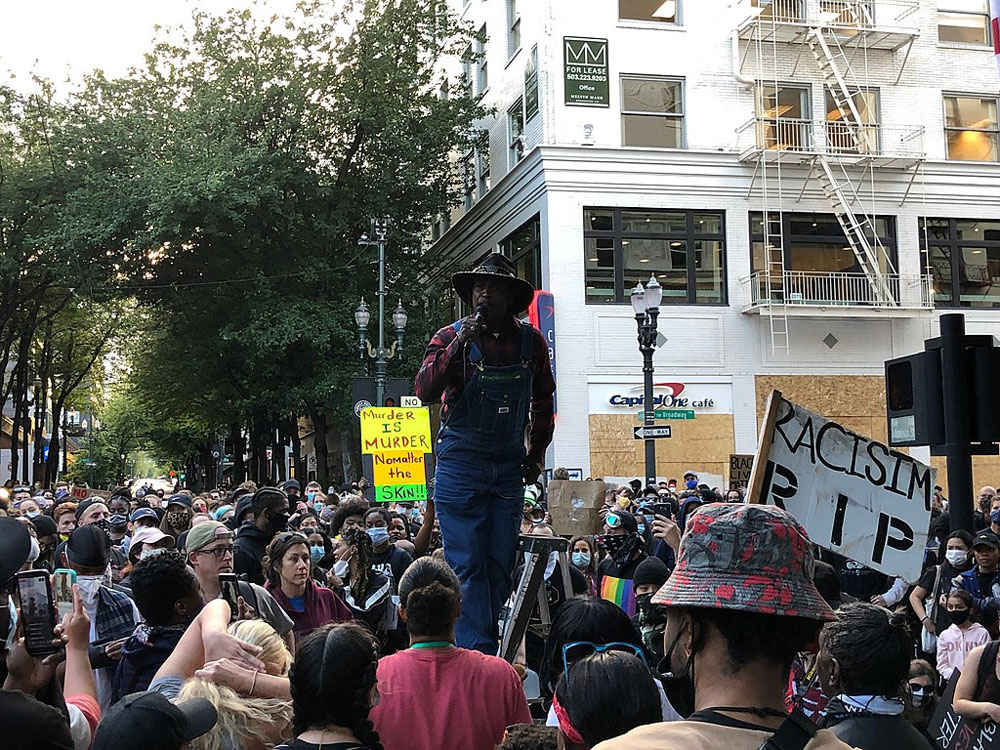
July 19, 2020; Washington Post
In the United States, policing is supposed to be a local function. But, on the streets, not so much.
The scenes are horrific. In Portland, Oregon, in the words of Mayor Ted Wheeler, “dozens, if not hundreds” of federal agents have detained at least two-dozen people, with unidentified Homeland Security officers shooing away residents in unmarked minivans.
Wheeler has called on federal agents to go home. “Their presence is neither wanted nor is it helpful and we’re asking them to leave,” Wheeler said. “In fact, we’re demanding that they leave.”
Kenneth Cuccinelli, acting deputy secretary of the Department of Homeland Security, refused. “We don’t have any plans to do that,” he remarked.
Portland resident Christopher David, age 53, tells the Washington Post that he attended his first protest this past Saturday after reading about the tactics used by federal officials. He wore clothes that he thought clearly indicated he was a Navy veteran and tells the Post’s reporters that he came to the protest with the intent of having a chance to talk with the officers.
As David explains, “I wanted to give them pause. I was hoping they would respect that long enough so that we could talk. I wanted to ask them why they weren’t honoring their oath to the Constitution. But that was overall a stupid idea, there was no talking.”
Instead, a federal officer dressed in camouflage swung a baton at him multiple times and another officer sprayed him in the face with pepper spray.
Sign up for our free newsletters
Subscribe to NPQ's newsletters to have our top stories delivered directly to your inbox.
By signing up, you agree to our privacy policy and terms of use, and to receive messages from NPQ and our partners.
“Their response was absurd,” Davis says. “They started out wanting to dominate and that’s exactly what they tried to do. There was no compromise, no de-escalation. They almost behaved like a mob. After a while, you didn’t know whether they were the proud boys or whether they were federal officers.” David ended up suffering multiple bruises and a broken hand.
Last Friday, Oregon Attorney General Ellen Rosenblum filed a federal lawsuit against Homeland Security and its subagencies Friday alleging the federal government had violated Oregonians’ civil rights.
In his statement, Rosenblum said, “the current escalation of fear and violence in downtown Portland is being driven by federal law enforcement tactics that are entirely unnecessary and out of character with the Oregon way. These tactics must stop. They not only make it impossible for people to assert their First Amendment rights to protest peacefully. They also create a more volatile situation on our streets. We are today asking the federal court to stop the federal police from secretly stopping and forcibly grabbing Oregonians off our street.”
Rosenblum is seeking a restraining order to “immediately stop federal authorities from unlawfully detaining Oregonians.”
In his statement, Rosenblum adds, “If this can happen here in Portland, it can happen anywhere.”
But in a Washington Post op-ed, Ivón Padilla-Rodríguez, a history graduate student at Columbia University, notes that the groundwork for the tactics employed in the current federal effort in Portland have been used for decades by federal immigration authorities. In other words, the practices that Rosenblum are denouncing have been happening nearly “anywhere” for some time now, but the media has tended not to notice because the people targeted were immigrants.
Padilla-Rodríguez points out that, “Historically, partnerships between local police and federal immigration authorities have made possible the surveillance and arrests of noncitizens and US citizens presumed ‘alien’ during extraordinary moments and manufactured narratives of crisis. These collaborations have contributed to the simultaneous expansion of the carceral state and deportation regime.”
Now, she adds, “expanded surveillance and policing capabilities are not only targeting and constraining the lives of immigrants, but US citizens.” It remains to be seen whether the US public, having seen an illustration of what militarized federal policing tactics look like, will demand changes to US immigration enforcement practice.—Steve Dubb













